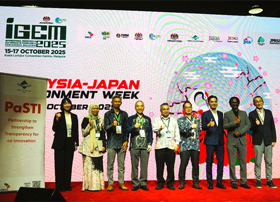Malaysia–Japan Environment Week: Seminar on “GHG Accounting and Reporting by Companies” was held in Kuala Lumpur
Kuala Lumpur, Malaysia / October 2025

Photo session
As part of the Japan–Malaysia Environment Week held in Kuala Lumpur, Malaysia on October 15 to 17, 2025, a seminar titled “GHG Accounting and Reporting by Companies” was held on October 16, 2025, through PaSTI. For further details about the Malaysia–Japan Environment Week, please visit the dedicated Environment Week website at: https://jprsi.go.jp/ew2025my/en/index.
This seminar focused on facility-level greenhouse gas (GHG) emission reporting systems and carbon pricing policies. Malaysian government introduced an emissions trading scheme and carbon tax currently under consideration for introduction in Malaysia, while the Japanese side presented its experience in operating the emissions calculation, reporting and disclosure system (SHK system).Representatives from International Organization emphasized that accurate calculation and reporting of greenhouse gas emissions are crucial for advancing carbon pricing, while private companies shared their respective initiatives. Discussions also explored effective approaches to promoting such reporting systems among companies in Malaysia and the broader ASEAN region.It was highlighted that some companies that have voluntarily started GHG accounting are already showing measurable progress in reducing their emissions, while the introduction of carbon pricing mechanisms will be essential to further advance emission reductions in an economically efficient manner.
In tandem with the event, a meeting between Ministry of the Environment, Japan and Ministry of Natural Resources and Environmental Sustainability (NRES) of Malaysia was held to strengthen collaboration under PaSTI. Both sides confirm the next steps for future cooperation. Following this, a study session was organized to share Japan’s experience in facility-level reporting systems and carbon pricing policies, which Malaysia is currently considering for introduction.




